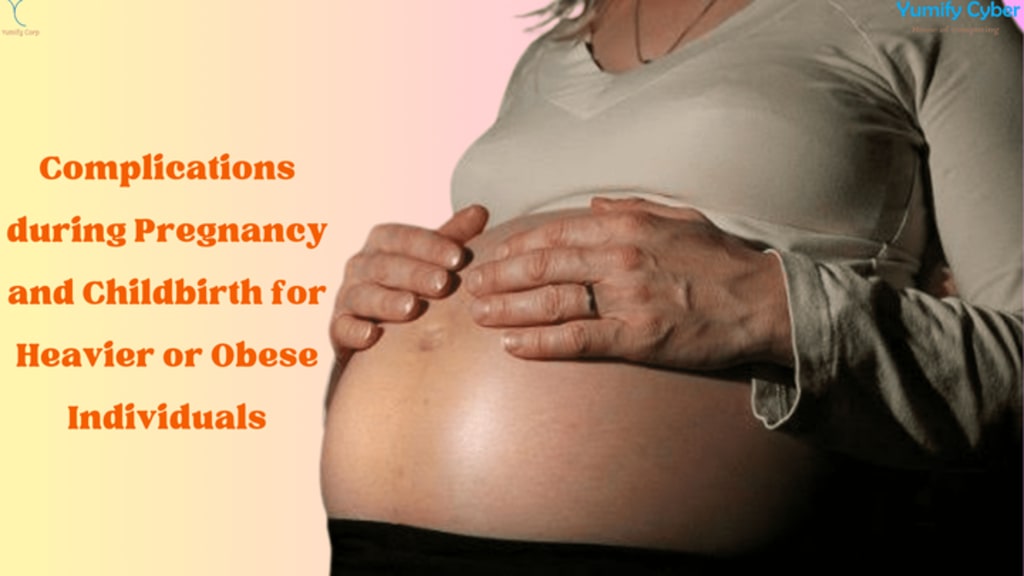Complications during pregnancy and Childbirth for Heavier or Obese women
The Complications heavy and obese women face during pregnancy and childbirth

Weight has a significant impact on pregnancy and childbirth, and heavier or obese women may experience certain complications. Let's delve into some of these potential complications and cite examples from past studies:
Gestational Diabetes
Gestational diabetes is a type of diabetes that occurs during pregnancy. It is characterized by high blood sugar levels (hyperglycemia) that develop specifically during pregnancy and typically resolve after childbirth. This condition affects how your body uses sugar (glucose), which is the primary source of energy.
During pregnancy, the body undergoes hormonal changes that can affect how insulin, the hormone responsible for regulating blood sugar, works. In some cases, the body may not produce enough insulin to meet the increased demand, leading to elevated blood sugar levels. This condition is known as gestational diabetes.
Heavier or obese women have a higher risk of developing gestational diabetes during pregnancy. This condition can lead to complications for both the mother and the baby, such as a larger birth weight for the baby(macrosomia or Large for Gestational Age [LGA]) and an increased likelihood of requiring a cesarean section delivery.
A study published in the Journal of Clinical Endocrinology and Metabolism found that obese women had a three times higher risk of developing gestational diabetes compared to women with a normal body mass index (BMI).
Obese pregnant women are at an increased risk of developing gestational diabetes, a condition where blood sugar levels rise during pregnancy. This can pose risks for both the mother and the baby, including macrosomia (large birth weight) and the need for a cesarean section.
Preeclampsia
Preeclampsia involves high blood pressure and damage to organs, such as the liver or kidneys, during pregnancy. It is more common in women with obesity. According to a study published in The New England Journal of Medicine, women with a BMI greater than 35 had a four-fold increase in the risk of developing preeclampsia compared to women with a normal BMI.
Increased Risk of Cesarean Section (C-Section)
Heavier or obese women tend to have a higher incidence of cesarean section deliveries. The additional weight can make it more challenging for the baby to pass through the birth canal. According to a study published in Obstetrics & Gynecology, women with a BMI greater than 30 had a significantly higher likelihood of requiring a cesarean section than women with a lower BMI.
Difficulties with Labor Progression
Obese women may face difficulties with the progression of labor, such as prolonged labor or failure to progress. This can be attributed to a variety of factors, including a larger baby size, increased fat tissue around the birth canal, and reduced uterine contractions. A study published in the American Journal of Obstetrics & Gynecology found that obese women had a higher likelihood of prolonged labor compared to women with a normal BMI.
Increased Risk of Postpartum Infections
Women with obesity have an increased risk of postpartum infections, such as endometritis (infection of the uterine lining) and wound infections. This is partially due to the increased presence of bacteria in the birth canal and the larger incision required for a cesarean section. A study published in Obstetrics & Gynecology found that women with a BMI greater than 30 had a higher risk of postpartum infections compared to women with a lower BMI.
Preterm Birth
Maternal obesity is associated with an increased risk of preterm birth, where the baby is born before completing a full term of pregnancy. Preterm birth can lead to health complications for the baby. A study published in the Journal of Maternal-Fetal & Neonatal Medicine in 2018 found that obesity was linked to a higher risk of preterm birth.
Birth Defects
Babies born to obese mothers might have a higher risk of certain birth defects, including neural tube defects and heart defects. A Research published in Birth Defects Research Part A: Clinical and Molecular Teratology in 2015 highlighted the association between maternal obesity and birth defects.
Labor Difficulties
Labor progression might be slower in obese women due to factors like increased adipose tissue around the pelvis, which can impact the baby's descent. A study published in the American Journal of Obstetrics & Gynecology in 2010 discussed the potential influence of maternal obesity on labor progression.
Anesthesia Challenges
Administering anesthesia, such as epidural, can be more challenging in obese individuals due to anatomical variations. A study published in the International Journal of Obstetric Anesthesia in 2017 explored challenges in administering epidural anesthesia to obese women during labor.
Summary
It's important to note that every pregnancy is unique, and the presence of these complications does not guarantee their occurrence in all cases. However, these examples from past studies highlight some of the potential challenges that heavier or obese women may face during pregnancy and childbirth. This is why it is crucial for healthcare providers to provide individualized care and support throughout the pregnancy process to ensure optimal outcomes for both the mother and the baby.





Comments
There are no comments for this story
Be the first to respond and start the conversation.